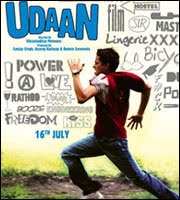
Director: Vikramaditya Motwane
Cast: Rajat Barmecha, Ronit Roy, Ram Kapoor, Aayan BoradiaRating:4 star
Much against our will, at several instances in life, one has to helplessly bow down to some entity – be it your teacher, boss, kin or anyone else. Udaan narrates a tale where a son is almost on an extended detention under his disciplinarian father’s domain. Through this allegory, Udaan inspires one to break away from all bindings of life and fly freely.
In its very first scene, four teenagers jump off their hostel compound wall to indulge in an adult film. Caught by the warden, they all are expelled from their school. One of them, Rohan (Rajat Barmecha) is sent back to his hometown Jamshedpur where his father (Ronit Roy), whom he hasn’t met for years, isn’t much happy to have him back. Rohan is also introduced to a younger stepbrother Arjun (Aayan Boradia), who he never knew existed.
Much against his aspirations of being a writer, Rohan is forced to study engineering and work part-time in his father’s factory. The tyrant rule of his father cuts off all the independence he enjoyed in his school days. As life turns more and more claustrophobic under the roof of his dominating father, the only respite he finds is in his uncle (Ram Kapoor) and college senior (Anand Tiwari).
The story of Udaan can be encapsulated as the unspoken track in 3 Idiots where the disciplinarian dean (Boman Irani) loses his son whom he tries to mould in his way rather than letting him live his life. Interestingly, Udaan doesn’t merely restrict the father-son divide till the academic expectations that parents have from their children, like in 3 Idiots or Taare Zameen Par . Ronit Roy’s multifaceted father figure is added with layers of frustration of being a single parent, a widower and having a regimented past of being brought up under as much discipline by his strict father which he carries forward to his children. He is caring but not loving. His quest for control has conquered his warmth as a parent. So much so that he wants his son to address him as Sir and not dad.
The writing by Vikramaditya Motwane and Anurag Kashyup is real, refreshing, straightforward and effective. The initial few sequences simply communicate the daily lifestyle of the father which the son is attempting to adapt to. But the proceedings keep you riveted because the routine is as much unusual to the viewer as much to Rohan. Also the writers at no point get carried away to portray the father as an outright villain. His character is balanced with sporadic humane shades but since he is too rigid and incorrigible, the story works towards the liberation of the son over the rectification of the father. The continual dominance of the father on the son doesn’t get monotonous, since the prolonged narrative gives time to Rohan to reach the threshold of his tolerance. That justifies, both, the slow pacing and the long length of the film.
The screenplay delicately works towards the relationships between the central characters. While the rift between Rohan and his father increases, reciprocally, he develops an endearing attachment with his kiddo stepbrother. Some scenes are kept long to stay with the protagonist and allow you to experience or at least relate to his mental turmoil. Yet the sequences don’t seem stretched and the director keeps the treatment comprehensible without tending to get artistic or abstract.
Rather director Vikramaditya Motwane makes efficient use of metaphors to emphasize his character conflicts. Rohan’s customary morning walks with his father ends with a running race which he keeps losing through the film. But as he outshines his father in the captivatingly choreographed climactic chase, narrowly escaping from his clasp, the director very competently establishes the son’s emancipation from his father’s military rule. In another scene Rohan’s classic Contessa car that fails to start despite repeated ignitions symbolizes the stagnant and standstill state of his life.
The narrative only peripherally touches its several subplots from Rohan’s yearning for his schoolmates (Manjot Singh), his spirited friendship with a college senior (Anand Tiwari) and his storytelling aspirations. The central focus is on the father-son rapport throughout thereby making the film one-dimensional to an extent. But the simplicity and minimalism with which Motwane handles his film charms the viewer.
The writing is interspersed with dollops of slice of life humour. For instance, the late night movie the school kids sneak into is titled Kanti Shah Ke Angoor (for the uninitiated, Kanti Shah is actually a Bollywood filmmaker known for making B-graders). In a sequence, Rohan and his college seniors pick up a fight with complete strangers, just for the kicks.
Cinematographer Mahendra Shetty beautifully captures mottled moods of the industrial city of Jamshedpur that serve as a perfect backdrop to amplify the internal turbulence of the protagonist. Sound designer Kunal Sharma adds to the effect with the metallic reverberations in the iron factory to the characteristic cheesy dubbing in Kanti Shah’s sleazy film. Amit Trivedi’s soulful tunes add depth to the character conflicts.
Udaan belongs to Rajat Barmecha, the teenaged powerhouse of talent who comes up with a confident, natural and remarkably restrained performance. Bearing faint resemblance to Imran Khan in certain frames, Rajat proves that he has much more to him than his cute looks and is an actor to look forward to. Ronit Roy comes up with a superlative award-worthy act as the authoritative father. Egotistical but not eccentric, Roy gives a new identity to characters usually made typecast by the likes of Nana Patekar. Ram Kapoor as Ronit Roy’s younger brother is another extraordinary actor in the film. As the compassionate and caring chacha , he seemingly didn’t follow his father’s stringent footsteps like his elder brother (Roy) seems to have. The argument between Ronit Roy and Ram Kapoor in the concluding reels is amazingly directed. Child actor Aayan Boradia is endearing. Manjot Singh (of Oye Lucky Lucky Oye fame) and Anand Tiwari are decent as long as they last onscreen.
In an industry known to indulge in larger-than-life ‘flights of fantasy’, Udaan is one of those intermittent ‘coming of age’ films from Bollywood. Do not miss!







